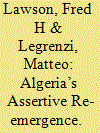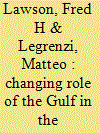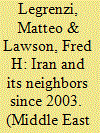| Srl | Item |
| 1 |
ID:
187261


|
|
|
|
|
| Summary/Abstract |
Algeria is re-emerging as an active player in international politics following the Arab Spring uprisings that swept across the Middle East and North Africa beginning in 2010–11. But it has adopted a much different posture from the one it maintained during the 1960s and 1970s. The broadly accommodative attitude that Algiers previously exhibited towards the outside world has been replaced by a more combative stance. Military power has become its primary tool for managing inter-state disputes, and Algeria has stepped up its involvement in the domestic affairs of nearby states. These changes have contributed to the resurgence of conflict in North Africa at a moment when the regional order might well have moved in a more peaceful direction.
|
|
|
|
|
|
|
|
|
|
|
|
|
|
|
|
| 2 |
ID:
154342


|
|
|
|
|
| Summary/Abstract |
In the past half-decade, the role of the Gulf in the international political economy has changed dramatically. The region’s position as a supplier of world hydrocarbons has slipped, even as local consumption of oil and gas continues to expand. Gulf investments have shifted from the industrialized countries to the Middle East and North Africa. Saudi Arabia no longer exercises disproportionate influence in the Group of 20. Finally, relations with the People’s Republic of China and India have become truly interdependent, which gives the Gulf the capacity to exercise leverage over these two rising powers, despite its diminished position in global affairs.
|
|
|
|
|
|
|
|
|
|
|
|
|
|
|
|
| 3 |
ID:
142163


|
|
|
|
|
| Summary/Abstract |
Relations between the People's Republic of China (PRC) and the countries of the Gulf have been subjected to an escalating barrage of scholarly scrutiny. At first, academic writing subsumed Beijing's dealings with the Arab Gulf states and Iran into comprehensive surveys of Chinese policy toward the Middle East as a whole. Three landmark monographs fixed the bar for these initial accounts: Yitzhak Shichor's The Middle East in China's Foreign Policy, Hashim Behbehani's China's Foreign Policy in the Arab World and John Calabrese's China's Changing Relations with the Middle East.1 Efforts to situate the PRC's policies toward the Gulf in the context of broader regional developments continue up to the present, as exemplified by Geoffrey Kemp's The East Moves West.2 Such first-generation studies set out to be comprehensive not only geographically, but thematically as well. Attention is usually paid to a wide range of diplomatic, military, economic and cultural trends, albeit with an emphasis on interstate diplomacy.
|
|
|
|
|
|
|
|
|
|
|
|
|
|
|
|
| 4 |
ID:
136205


|
|
|
|
|
| Summary/Abstract |
Iranian foreign policy in the 25 years after the 1978-79 revolution centered on the cultivation of strategic alignments with a wide range of radical states and revolutionary movements throughout the Middle East. Relations with this heterogeneous collection of regional partners, particularly those with Syria and the Lebanese Shii organization Party of God (iezbollah), left the Islamic Republic vulnerable to periodic threats of entrap¬ment and abandonment by its allies. This in turn had a direct impact on Iran's relations with regional adversaries
|
|
|
|
|
|
|
|
|
|
|
|
|
|
|
|
| 5 |
ID:
152544


|
|
|
|
|
| Summary/Abstract |
Why the uprisings that broke out across the Middle East and North Africa in 2010-11 ousted the leaders of republics but left monarchies largely intact remains puzzling. One promising explanation for the resilience of monarchical regimes argues that monarchs exercise repression in a comparatively restrained and largely effective fashion. Proponents of this theory tend to conflate two crucial causal factors: the level of state coercion exercised against opposition activists and the degree of indiscriminateness with which coercion is deployed. By treating these variables as analytically distinct, a more compelling explanation for monarchical resilience can be advanced. The advantages of the revised argument are illustrated by revisiting the divergent trajectories of the uprisings in Bahrain, Oman, Saudi Arabia and Kuwait.
|
|
|
|
|
|
|
|
|
|
|
|
|
|
|
|
| 6 |
ID:
145567


|
|
|